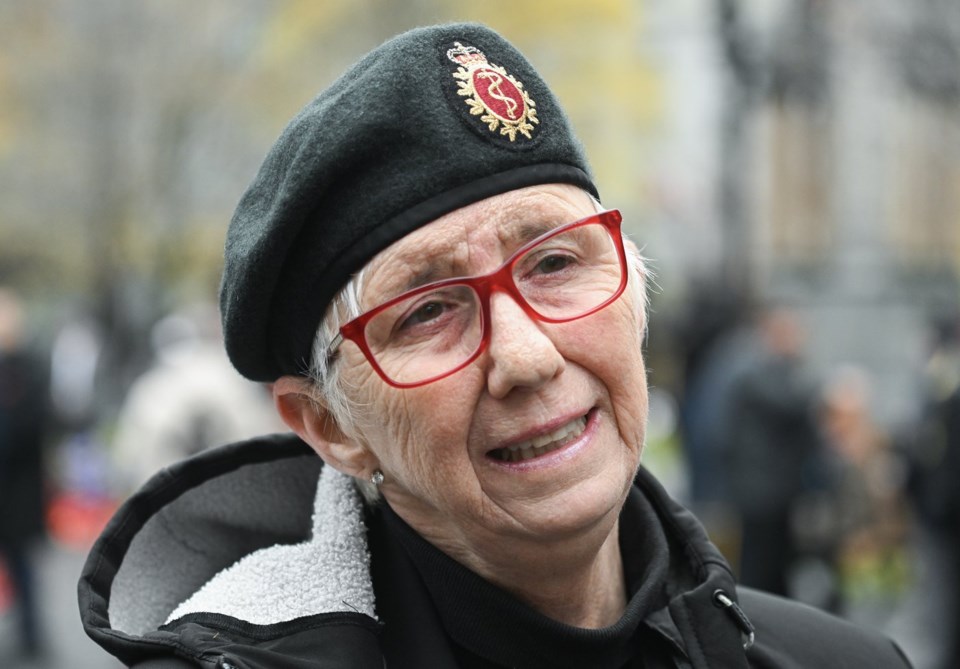MONTREAL — Private Martine Roy was only 20 years old in 1984 when she was arrested, interrogated and dismissed from the Canadian Armed Forces for being what was then termed a "sexual deviant."
After fighting for the right to be recognized as a veteran, she laid a wreath at Montreal's Remembrance Day ceremony Monday on behalf of survivors of the wave of persecution that has become known as the LGBT Purge.
"I was arrested twice, then sent to a psychiatrist and then finally dismissed," she said of her experience. "That was really, really hard for me."
Roy was one of the lead plaintiffs in a class-action lawsuit that led to a $145-million settlement and a 2017 federal apology for decades of discrimination against members of the lesbian, gay, bisexual and transgender communities.
According to the website of the LGBT Purge Fund, between the 1950s and mid-1990s, LGBTQ+ members of the Armed Forces, the RCMP and the federal public service were followed, interrogated, abused, traumatized and often fired "as a matter of policy and sanctioned practice."
Roy, a Montreal native, enlisted in 1983 to become a medical assistant. After a stint in Quebec she was sent to Borden, Ont., where she was arrested the first time after someone found out she was dating women as well as men.
While she was allowed to finish her course and move to the now-closed National Defence Medical Centre in Ottawa, she was arrested a second time and discharged in December 1984.
She said her removal from the Armed Forces at such a young age affected every aspect of her life, and she struggled for years with shame, drug use and fear that she would be subjected to further discrimination in the workplace.
"I was 20, I didn't know if I was gay or not. I don't think it was important at that moment," she said. "So kicking me out like this, I didn't want to tell anybody. I was ashamed."
She said the trauma went so deep that she didn't return to Ottawa until 2014. For years, she and others like her weren't recognized as veterans at all.
Over time, Roy went on to have a stable career and became an advocate for LGBTQ+ rights and better inclusion in the workplace. She began to feel like the federal government's decision to reverse its official policy of discrimination in 1992 wasn't enough.
That's when she got involved in the class action and, later, as a board member for the LGBT Purge Fund. In 2023, she was appointed a member of the Order of saąúĽĘ´«Ă˝ for her decades of advocacy for diversity, inclusion and equity.
On Monday, under drizzly skies, Roy joined Premier François Legault and other dignitaries who gathered at a downtown square for Montreal's Remembrance Day ceremony. She laid a wreath on behalf of LGBTQ+ veterans alongside fellow purge survivor Peggy Hayes.
Roy said attending Remembrance Day ceremonies allows her to feel like a part of the military as a veteran, and to commemorate others who had similar experiences but are no longer living.
Laying wreaths is meaningful, she said, "because we are important, and the queer people that fought for saąúĽĘ´«Ă˝ are important."
She said that for many purge survivors, memories of service is "kind of a double thing:" a mixture of pride over serving their country, and the knowledge that they were let go for something that had nothing to do with skills.
"We did that to over 9,000 people," she said of the purge. "We destroyed their family and their life, so this is why today is so important."
She said some of the money from the court settlement is being used for initiatives that honour the contribution of saąúĽĘ´«Ă˝'s LGBTQ+ veterans, including a monument in Ottawa dedicated to purge survivors. The LGBT Purge Fund is also collecting and preserving records of the purge, working on an exhibition at the Canadian Museum for Human Rights in Winnipeg and making recommendations on how to improve LGBTQ+ inclusion in the public service.
This report by The Canadian Press was first published Nov. 11, 2024.
Morgan Lowrie, The Canadian Press


